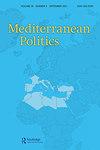Political narratives in the Middle East and North Africa. Conceptions of order and perceptions of instability
IF 1.3
3区 社会学
Q1 AREA STUDIES
引用次数: 4
Abstract
emphasizing the class dimension – two strands that have rarely been connected in the analysis of Lebanon. The volume also has the merit of providing a detailed and timely analysis of the main alliances between Lebanon’s political parties and how they have been re-arranged especially in some important debates that have informed political life – most importantly, regarding elections and election law. But not only that: The volume offers insight into the political forces in the field and the intraand inter-sectarian conflicts by connecting them with the external alliances that have forged and influenced them. This analysis explains some apparent ‘oddities’ of Lebanese political life, of which the alliance between the Shiite Hizballah and the Christian Free Patriotic Movement is the most evident. Between the lines, however, the analysis also explains the Lebanese political elites’ ability to increase the pressure almost to breaking point. Through a skilful and wise use of sectarian language to mobilize and demobilize their sectarian members, Lebanese politicians have created a short circuit that continues to hold Lebanese democracy hostage to this day. Although the most recent events (the protests of October 2019, the Eurobond default of March 2020 and the explosion at the port of Beirut on 4 August 2020) seem to have restarted some processes that had been silenced or dormant in previous years, the difficulties of the political parties to converge on a new government suggests that Assi’s argument is, sadly still valid.中东和北非的政治叙事。秩序观念和对不稳定的认知
强调阶级层面- -在分析黎巴嫩时很少把这两个方面联系起来。这本书的优点还在于详细而及时地分析了黎巴嫩各政党之间的主要联盟及其如何重新安排,特别是在影响政治生活的一些重要辩论中- -最重要的是关于选举和选举法的辩论。但不仅如此:这本书还通过将这些政治力量与形成并影响它们的外部联盟联系起来,深入了解了该领域的政治力量以及宗派内部和宗派之间的冲突。这种分析解释了黎巴嫩政治生活中一些明显的“怪事”,其中最明显的是什叶派真主党和基督教自由爱国运动之间的联盟。然而,在字里行间,分析也解释了黎巴嫩政治精英们增加压力的能力,几乎到了崩溃的地步。黎巴嫩政客巧妙而明智地使用宗派语言来动员和遣散其宗派成员,制造了一个短路,直到今天仍继续将黎巴嫩民主作为人质。尽管最近的事件(2019年10月的抗议活动、2020年3月的欧洲债券违约和2020年8月4日的贝鲁特港爆炸)似乎重启了前几年沉默或休眠的一些进程,但各政党在组建新政府方面的困难表明,可悲的是,阿西的论点仍然有效。
本文章由计算机程序翻译,如有差异,请以英文原文为准。
求助全文
约1分钟内获得全文
求助全文
来源期刊

Mediterranean Politics
Multiple-
CiteScore
4.40
自引率
5.90%
发文量
37
期刊介绍:
Mediterranean Politics is the only refereed academic journal to focus on the politics, international relations and political economy of the entire Mediterranean area - "Mediterranean" here being understood to refer to all those countries whose borders are defined partially or wholly by the Mediterranean Sea. This focus involves consideration not only of the region itself, but also the significance of developments there for other parts of the world. The journal analyses the central issues that concern Mediterranean countries and assesses both local and international responses to them. While its prime concern is with political developments, the focus of Mediterranean Politics extends to all the factors and dimensions affecting political life.
 求助内容:
求助内容: 应助结果提醒方式:
应助结果提醒方式:


